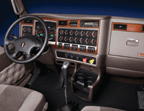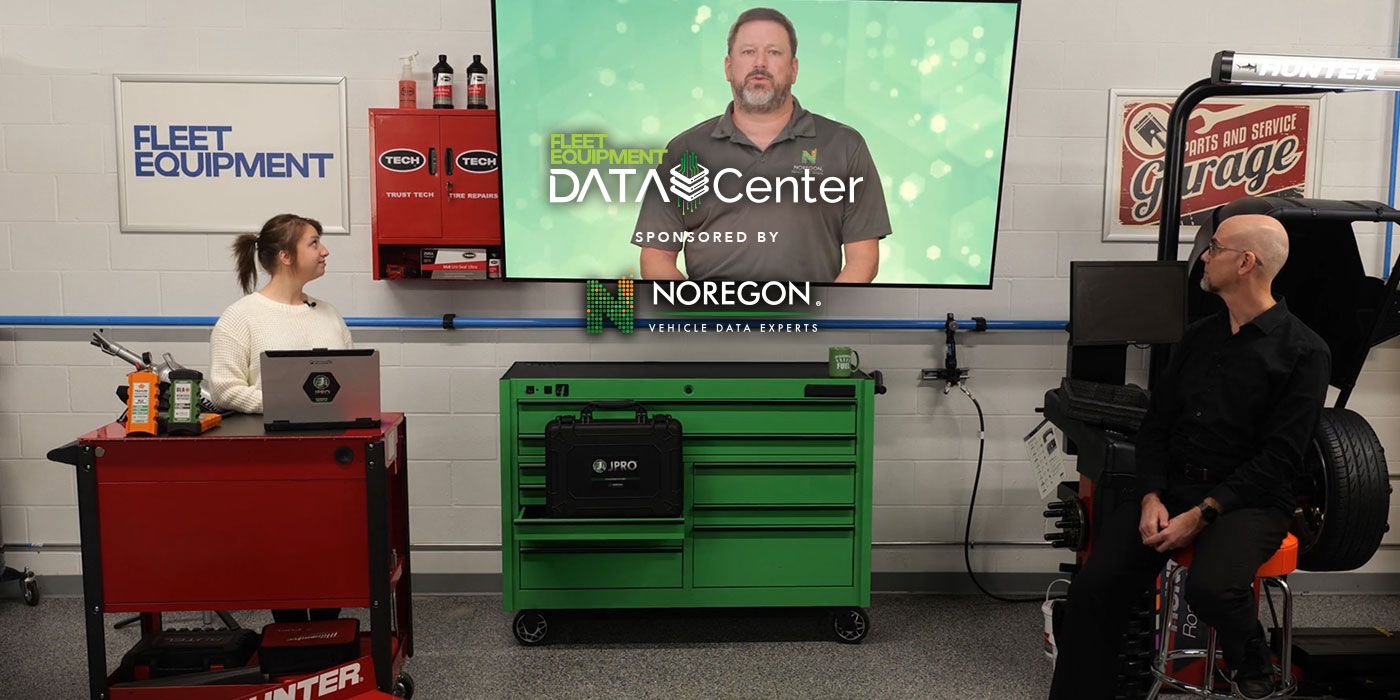How important is resale value when writing specifications for new tractors? What premium systems and components raise the resale value of tractors?
Is it possible to place a dollar value on the increase in resale value for specific components?

“From a leasing perspective, resale value is critically important,” says Vince DiSchino, director of business development at Regional International and Idealease. “It’s the final determination of whether or not the lease was profitable, so we must realize at least the residual we determined at the time of purchase.”
Among the factors that impact resale value is the price of the new truck.
“Simply put, the more you pay up front, the more it’s worth,” he says, “because resale is generally a percentage of the original cost. Also, other parts of the equation are mileage, accessories, where it’s being sold and who wants it when it is for sale.”
Darry Stuart, president of DWS Fleet Management Services, an independent “limited time executive” transportation and fleet management business that serves a number of fleets, says residual value is “a strong consideration for the unknown. It won’t make or break a deal,” he says, “because, in most cases, projecting resale value is an exercise designed to arrive at the number you want to see. It’s really a number that accounting or financing people need to put in place to manage monthly costs.”
“Resale value is driven by the market,” says Pete Nativo, vice president of maintenance at Transport Service Co. “Currently, it’s a seller’s market because the higher-priced engines that meet 2007 emissions regulations are making used trucks more attractive.
“The area in which you are selling also drives resale value, Nativo says. “For instance, the Chicago area is a big day-cab market, but in other areas, there is not as much demand for that type of vehicle.”
The type of operation also can determine the approach to spec’ing for resale value, says David Foster, director of maintenance at Southeastern Freight Lines.
“We don’t spec tractors with resale value in mind because 98 percent of our power units are day-cab tractors, and our trade cycles are as long as 1 million miles in line-haul service and 12 years/400,000 miles for P&D units,” Foster says. “We spec components and systems that give us the best service at the lowest cost per mile for the trade cycle we have modeled.”
Premium components
For DiSchino, the determination about premium systems and components that might raise the resale value of tractors is based on “what we think we’ll do with the unit at end of its service life,” he says. “It’s not really possible to place a dollar value on the increase in resale value for specific components, but you can broaden the audience. And more buyers can mean higher resale values.
“While horsepower is a spec’ing for resale consideration,” DiSchino continues, “bigger sleepers do not necessarily translate into higher used truck values. In most cases, premium components are specified to lower maintenance costs but can also boost resale value by enhancing appearance. For example, aluminum wheels look better and don’t rust, and rust is the biggest thing that can lower a tractor’s resale value. The important thing is to build appearance into the spec’ing and maintenance process so you don’t have to spend money to sell the truck.”

“Unlike 20 years ago, when a fleet could be virtually assured to get back an investment in premium components, today, items that used to automatically bring higher resale values are now standard in the minds of used truck purchasers,” Stuart says. Premium specs don’t necessarily mean higher resale, and the difference between plain and premium models is usually equal to the difference in initial purchase price. There’s no longer a guaranteed windfall in buying higher-price items to maximize resale value.
“While most premium items have become standard specs, two items do continue to help boost resale value of tractors,” Stuart says. “One is a higher-horsepower engine. The second is aluminum wheels, but it’s not just a question of higher value but, rather, which truck will sell the fastest because it looks better. Resale is about how clean you keep the truck, inside and out. Premium specs are more about how economically the vehicle can be operated and maintained.”
“Every time we spec tractors, we consider resale value,” says Nativo. “It’s a very important part of the job. Among the items we feel can add to resale value are the size of the sleeper and the engine. A premium sleeper size can bring $2,000 or more, and higher-horsepower engines are good for $1,500 to $2,000, based on the mileage on the unit.”
At Southeastern Freight Lines, driver comfort and horsepower are considerations when spec’ing, according to Foster.
“We’ll spec a premium seat for comfort, even though it may not mean the lowest cost,” he says. “For the 2 percent of our fleet that is sleeper equipped, we purchase 450-horsepower engines, and on day cabs, we’ve also bumped up the engine rating from 330 to 410 horsepower.”
Day-cab conversion
While there is less concern about resale value when fleets are writing specs for day cabs compared to sleepers, in some markets, a used sleeper-equipped tractor can be worth less than a day cab due to demand by second owners, according to Stuart.
“The reality is that the projected resale value of a sleeper may be lower than that of a comparable day cab,” he says. “The ability to remove the sleeper and turn the tractor into a day cab can be a method of enhancing the resale potential of a truck, but you have to factor in the cost to convert it.”
To help fleets enhance the potential resale value of used premium tractors, several OEMs have made day-cab conversions a part of their product offerings. Peterbilt Unibilt models, for example, offer the flexibility to be configured as a day cab or with a full range of sleepers. The Unibilt sleeper system allows the sleeper to be detached from the cab, providing a second or third service life as a day cab in regional or vocational applications.
Kenworth Truck Co. offers an original equipment kit to convert its AeroCab sleepers on T600, T800 and W900 models to extended day cabs. With the factory-designed conversion kit, the sleeper is unbolted from the cab, and a new, one-piece back wall assembly is moved into position. The extended day-cab conversion can be completed at dealerships and requires no major modifications to the cab structure, the company said.
Mack Trucks also has a DayCab conversion kit option. The retrofit kit converts sleepers into day cabs on all of the company’s Vision models, as well as its CH walkthroughs. The DayCab conversion kit, available through any dealer, consists of a welded subassembly or structural kit – essentially a new rear wall for the cab, complete with bolt on reinforcements – and suspension and interior trim kits. Once a sleeper section is removed and other prep work is accomplished, the DayCab conversion kit can be installed without special tools in fewer than eight hours, according to the company.
Freightliner, on the other hand, recently announced its departure from the day-cab conversion market and the closing of its reconfigured day-cab manufacturing operation. The Tooele, Utah, facility was dedicated to refurbishing and reconfiguring used heavy-duty vehicles. The operation opened in 2000 amidst a market shortage of quality used day cabs and depressed sleeper-cab values. Freightliner described the manufacturing operation’s closure as a response to market conditions, including strengthened used truck values and an increase in demand for used sleeper cabs.
Consider alternatives
Dealers and OEMs can help fleets address resale value when writing specs by keeping them up to date about what used truck customers are requesting when shopping for used equipment, according to Nativo.
“As a dealer,” says DiSchino, “we review components and alert customers about things that would make the unit unique. It may not be possible to get a return on those items, so it’s important to consider alternatives.
“For example, color affects resale value,” he says. “White trucks always sell faster, and special colors that may be associated with a particular fleet, or heavy graphics that have to be covered up, can bring down the price.
“Custom specifications may be an old habit that minimizes resale options,” DiSchino says. “For example, if your business changes, and we can easily use the vehicle in a rental fleet, we would be more open to work with you and lessen penalties than if we had to sell it. Decide what you think you need and what you really need, and look at the big picture from maintenance and resale standpoints.
“A rule of thumb is to spec for a second life so the used truck buyer, wholesale or retail, can expect two maintenance free years of normal use,” DiSchino adds. “Also, timing of delivery and purchase is important. The sophisticated used-truck buyer goes by VIN, and depending on the time of the sale, a two -year difference in model year is possible. Time your trade to have the shortest life on paper. In the end, everything is a factor.”
In today’s environment of tight budgets, high prices and driver shortages, projecting residual value and investing up front for a higher return on used vehicles is a lost art, according to Stuart.
“Spec’ing for resale used to be an area of expertise, and it made sense to buy right and put items on the vehicle that will help sell the truck in the future,” he says. “A return to that tried-and-true practice could help eliminate some of the volatility in the market, the uncertainty that is now associated with buying tractors and pay dividends for fleets in the process.”


